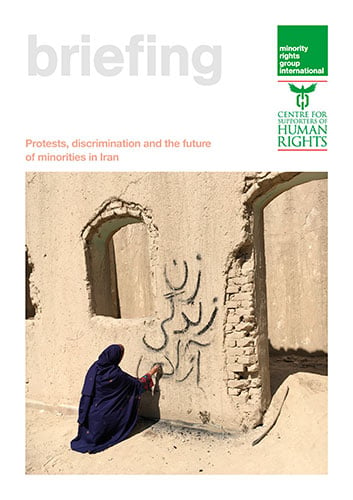
MRG welcomes UN resolution on fact-finding mission in Iran, but gaps remain
At its 35th special session yesterday, the UN Human Rights Council passed a resolution that creates a new fact-finding mission to investigate alleged human rights violations in the Islamic Republic of Iran. MRG welcomes this action and commends UN member states for recognizing the feminist movement that ignited the protests in Iran which commenced on 16 September 2022, and for taking proactive steps to challenge impunity for gross rights violations.
The death of 22-year-old Kurdish woman Jina (Mahsa) Amini sparked a nationwide protest movement that shows no signs of abating. At least 364 people have been killed, including at least 41 children, and an estimated 15,000 protestors have been detained. Despite these crackdowns and internet blackouts, calls for liberty, justice and equality for women, minorities and other oppressed communities have echoed around the world. By passing this monumental resolution, the international community has signalled that Iranian civil society is seen and heard.
Yet, notable gaps in the resolution may well hinder its success in practice.
While it rightly focuses on the situation of women and girls in Iran and deplores the disproportionate targeting of minorities in the protests, it does not do enough to address the intersectional identity dimensions of the social movement and its suppression. The longstanding discrimination and marginalization of minorities, including Kurds, Baluchis, Arabs and Azerbaijani Turks have been a key driver of protests in Iran since 2017. The current protest movement is intrinsically linked and informed by minority concerns, including the repression of marginalized cultures, identities and religions.
For decades, discrimination against minority groups has fuelled high tensions between state and society. This is indicated by the fact that the September 2022 protests began in Kurdish provinces, where the population harbours great disillusionment and frustrations with the governing state. Minorities, particularly Kurds and Baluchis, have been disproportionately targeted in arrests, killings and gender-based violence since September. Provinces most inhabited by minorities are also the most heavily policed.
Simply recognizing that minorities have been impacted is not enough. To address the root causes of the protests, investigative mechanisms must also focus on all intersecting identity factors that have contributed to the systemic nature of human rights violations in Iran. If not, the fact-finding mission risks failing to pave the path to justice for those who have suffered the brunt of the Islamic Republic’s crackdown, largely because of their identity.
Jina Amini was a woman, and she was Kurdish too. MRG urges the international community to approach the investigative process with a true intersectional lens, in honour of Jina and all other Iranians who have risked and in too many cases lost their lives to demand their rights and liberty.
 A Baloch woman writes ‘Women, Life, Freedom’, the slogan originating in Kurdish grassroots movements and adopted by protestors across Iran, on a wall in Sistan-Baluchestan, Iran, 2022. Credit: Anonymous.
A Baloch woman writes ‘Women, Life, Freedom’, the slogan originating in Kurdish grassroots movements and adopted by protestors across Iran, on a wall in Sistan-Baluchestan, Iran, 2022. Credit: Anonymous.

